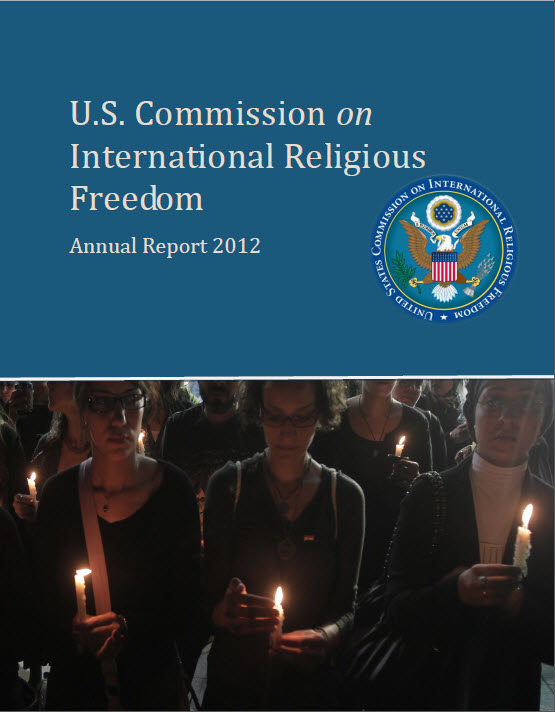2012 Religious Freedom Report Notes Sixteen Countries of Concern, Nine on Watchlist

The United States Commission on International Religious Freedom (USCIRF) has on 20 March released it 2012 Annual Report. The 2012 report documents religious freedom abuses and violations in 25 countries around the world. As reported by USCIRF Chair Leonard Leo, the Annual Report:
- Recommends that the Secretary of State designate the following eight additional “countries of particular concern,” or CPCs, under IRFA for egregious violations of religious freedom: Egypt, Iraq, Nigeria, Pakistan, Tajikistan, Turkey, Turkmenistan, and Vietnam.
- Recommends that eight countries be re-designated as CPCs: Burma, China, Eritrea, Iran, North Korea, Saudi Arabia, Sudan, and Uzbekistan – and that additional actions be taken;
- Documents violations of religious freedom in countries placed on the USCIRF Watch List and urges increased U.S. government responses: Afghanistan, Belarus, Cuba, India, Indonesia, Laos, Russia, Somalia, and Venezuela.
- Highlights the alarming rise in religiously-related violence that governments have failed to redress through investigation, prosecution, and punishment and the national security implications of prioritizing religious freedom.
Among the other important observation of the Report are the observations in Appendix 3: International Standards for Constitutional Religious Freedom Protections: Several countries in the world are or soon will be drafting new constitutions. It is vital that these constitutions protect universal human rights, including the right to freedom of religion or belief. Based on its experience analyzing constitutions against international standards, USCIRF offers the following guideposts for the full protection of religious freedom consistent with international human rights law:
- Freedom of Religion or Belief is a Universal Right
- Freedom of Religion or Belief is a Broad Right for Every Individual
- Freedom of Religion or Belief Includes Freedom of Religious Choice and Expression
- Permissible Limitations on Freedom of Religion or Belief Are Narrow
- Establishing an Official Religion Cannot Justify Rights Violations or Discrimination
“It’s no coincidence that many of the nations we recommend to be designated as CPCs are among the most dangerous and destabilizing places on earth,” said USCIRF Chair Leonard Leo. “Nations that trample upon basic rights, including freedom of religion, provide fertile ground for poverty and insecurity, war and terror, and violent, radical movements and activities.”
USCIRF is an independent, bipartisan U.S. federal government commission. USCIRF Commissioners are appointed by the President and the leadership of both political parties in the Senate and the House of Representatives. USCIRF’s principal responsibilities are to review the facts and circumstances of violations of religious freedom internationally and to make policy recommendations to the President, the Secretary of State and Congress.